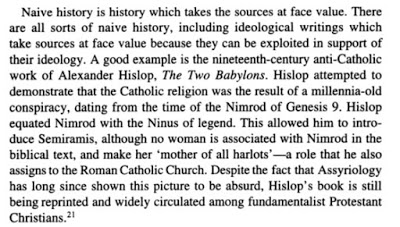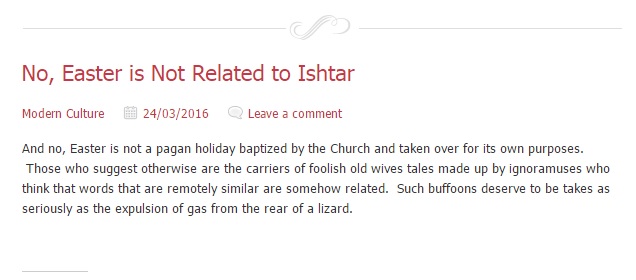Dear Mr Meredith, Jim West has sent a message. I think it might be for you, with a cc. to Vic (UCG), Dave (RCG), the other Dave (COGAIC), Bob (with the highly esteemed 'Trinity' ThD he picked up in India), the other Jim (COGWA) and Gerry (PCG).
(Jim is the outspoken biblioblogger at Zwinglius Redivivus.)
Showing posts with label Easter. Show all posts
Showing posts with label Easter. Show all posts
Monday, 28 March 2016
Saturday, 26 March 2016
Hislop - his slop
 Among dyed-in-the-wool COG preachers, Alexander Hislop is regarded as an authority, and his 1858 book The Two Babylons is treated as an accurate historical source second to none. Hislop is seen as an unimpeachable expert on the 'true' origins of Easter.
Among dyed-in-the-wool COG preachers, Alexander Hislop is regarded as an authority, and his 1858 book The Two Babylons is treated as an accurate historical source second to none. Hislop is seen as an unimpeachable expert on the 'true' origins of Easter. |
| Grabbe, Can a 'History of Israel' Be Written? p.28. |
Roger Pearse asks a few more pertinent questions about Hislop's credibility in a recent blog post. Worth reading if you've ever wondered just how much weight to give the old thumper when he's quoted in COG literature.
Tuesday, 22 March 2016
Easter and the fertility goddess
We have been warning all our Western nations — and countries all around the world — that God will judge them for their lawlessness and evils (Joel 3:12-13). By the time you receive this letter, hundreds of millions of professing Christians will have celebrated one such evil — a pagan Easter Sunday — on March 27. Millions of Eastern Orthodox will observe Easter a month later, on May 1... Why do nearly all of our world’s 2.2 billion professing Christians participate in a non-biblical religious tradition named after a pagan fertility goddess? As I told our Atlanta audience, if any of you are observing that festival, you need to repent!
Richard Ames
Co-worker letter, March 18
Easter is evil. It's named after a pagan fertility goddess. Richard Ames thinks so, but is that really true?
Word derivations can be complicated, and false trails abound. There is a line of logic that connects Easter with an Anglo-Saxon goddess who rejoiced in the name Eostre. But there's a problem. The only source we have for this connection is the Venerable Bede, a monk in the 7th century. Everything we know about Eostre comes from Bede, and it's precious little. There's a very good chance that this name died out, and that the modern English term Easter has a quite different derivation.
All major languages except two refer to this festival by a term related to the Greek Pascha (from Pesach - Passover). In Spanish it's Pascua, in Dutch Pasen, in Latin Pascha, in Italian Pasqua. The two exceptions are German and, obviously, English.
The modern English usage seems to come from the German Oster. Blame Martin Luther. When he translated the New Testament he chose Oster, a German word for resurrection, alluding to the metaphor of sunrise.
Up till Luther's time, the only English translation of the Bible, John Wycliffe's, used the word Pask. No mention of Eostre. Later, William Tyndale, who was greatly influenced by the Luther Bible, adopted the Reformer's preference and coined a new term, Ester. The King James translators, with the sole exception of Acts 12:4, went back to the earlier usage, Passover. The name Easter, however, stuck.
So, other than the German Oster, major languages other than English use a version of Passover. The English term Easter came into usage via the German and Tyndale's Bible. The whole Easter/Eostre issue is meaningless in most other languages. Even in English, the identification with Eostre is dubious.
Any questions? Probably best not to ask Ames.
There's a nice discussion of these issues here.
Subscribe to:
Posts (Atom)

